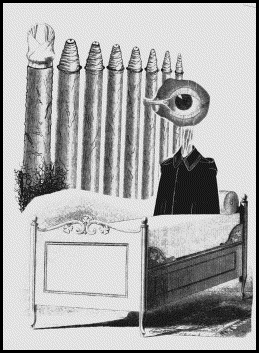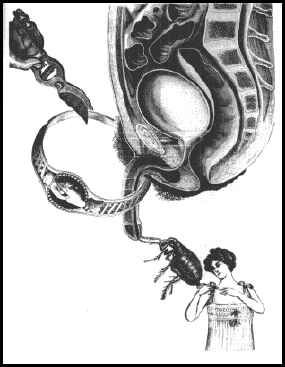Blind Spot
Tales from the
New Century
Alexander Kluge
(New Directions)

- Those who judge of a work by rule are in regard to others as those who have a watch are in regard to others. One says, "It is two hours ago"; the other says, "It is only three-quarters of an hour." I look at my watch, and say to the one, "You are weary," and to the other, "Time gallops with you"; for it is only an hour and a half ago, and I laugh at those who tell me that time goes slowly with me and that I judge by imagination. They do not know that I judge by my watch.
Kluge offers some 173 "stories" but they are really aperçus, like his vision of Chernobyl --- complete with an appalling picture of a cur caught in the original burst of radioactivity. Or the story about the much-admired Admiral Bull Halsey, at the end of WWII, who demanded that the entire U. S. Navy set sail across the Pacific from Japan. There were three typhoons "that destroyed more U. S. ships than the entire war" said a critic. It was hushed up. Or there is the tale of a high-ranking officer at the Pentagon who seriously contemplated the idea of the United States dyeing the Arctic and the Antarctic bright red so that the climate in the world would change ... perhaps to the disadvantage of the Russians (it had to do with the reflective value of red snow over white snow). No one was quite sure what it would have done to you and me and the rest of the world. There is also the story of astronomer Fred Zwicky who said if he stopped looking at "the central red light of a spiral galaxy [to] where he could see the speckled distribution of pale blue stars and of nebulæ shimmering in the winds, he could hear a kind of VIOLIN MUSIC."
And finally there is this: Consequently Brooks removed the organ designed for these review controls: what, in a robot, could be described as the HEAD (this was a kind of casket attached at an angle to the underside of the carriage). Without such a "head," the gripper arms and motor functions responded directly to the outside world. Because I doubt, said Brooks, that a refined insect, say a dragon-fly, perceives or directs the mass of information (humidity, position of the sun, water surface, prey. obstacles, changes in speed) through a central organ. If you look for the actual motion controls, they can be found at the very start, when such a species emerged millions of years ago. That's where the "head" is, long ago. Now, however, it's all spontaneous reaction. The senses and the elements make contact with one another individually and without central control. This anarchic projectile has been displaying itself over ponds for millions of years. As soon as I had removed the head, reports Brooks, the robot moved at great speed. It developed a sensory relationship with the obstacles. We will already be demonstrating the appliance this week. --- You call it an appliance, but talk about it like it's a living thing. (The dialogue at the end is part of Kluge's microdrama, with which he archly comments on the previous narrative.) All 173 aperçus are funny, scary, ironical, inspired, wild, and worth every moment of your time.
--- It is a living thing.
--- How does one recognize a living thing?
--- By its spontaneity, by its directness.
--- Not by its self-control?
--- Only if that's spontaneous.
Handbook
Surviving Sex,
Drugs and
Petty Crime
Neeraja Viswanathan
(Bloomsbury)
It's all crazy, Kafkaesque, of course, all to put you off and make you a law-abiding citizen just because there is too much to know.
No such sageness is to be found in present-day America. The preachers, the professional puritans in congress and the state legislatures band together with the drug trade (usually physicians and drug-lord types) to outlaw even the most innocent pleasures. According to this book, marijuana and psilocybin are "Common Schedule 1 Drugs," right up there with heroin. Opium --- smoked regularly by the little old ladies of China, Laos, Viet-Nam, Burma and India for their bodily aches and pains appears as a Schedule II drug, alongside crack and Ritalin (the latter being force-fed, legally, by school authorities and ignorant parents, to the very young).
Thus the "drug question" has driven our entire democratic system of jurisprudence quite mad. At a cost of between $35 - $100 a day, 2% of our minority populations have to be fed, clothed and tended in our latest, 21st Century housing projects, known as jail --- or more scientifically --- "the pen." There's a rich payoff in the whole system for those who build these Graybar hotels and for those who staff them. The latter are men and women paid by the state to "do time" alongside the jailees, staying well out of the way of the true authority figures ---- those who actually run the penitentiaries --- the cons themselves. A wise state representative will never go against the wishes of the guards' unions for pay raises and those contractors who specialize in constructing further rooming houses for the poor and the minority. State budgets for salaries, maintenance, clothing and food in this newest of service industries are, in some areas, running 25% of the annual discretionary budget.
Street Law Handbook is chock-ablock full of facts and figures. The difference between Grand Theft and petty theft, between "breaking and entering" and "trespass." "Conspiracy" vs. "Overt Act." "Assault" vs. "Battery:" As you can see the language in Street Law is direct and simple, and there are, for some of us, enough surprises of the I-didn't-know-that variety. I always thought that my Miranda rights began the moment I started being questioned by a policeman --- Miranda being those warnings "connected to your right against self-incrimination, and your right to have legal counsel before a custodial interrogation." Not so. The rights are read to us only after we are in custody. Custody is defined as when you, "as a reasonable person, do not feel free to leave the situation. You are either being physically restrained (cuffs, etc.) or told by an authority that you are not free to leave." The worst failing of Street Law is that there is no index. When they start pounding on the door, and you want to know what the hell to do, you'd have to damn near go through all 230 pages to figure out where you're at, or where you're going to be.Contrary to popular belief, assault isn't when you beat someone up. Simple assault occurs even when you threaten someone enough to make him believe that you're going to harm him. If there is an injury, then it's minor. Battery is "offensive touching," which can be as small as that of a hangnail. Usually you'll be charged with assault and battery if you're in a fight.
He's hired on to pump up the reputation of Steven Brightman, a New York politician. The word is out that Brightman killed one of his young lady assistants. Moe is hired to prove that wrong. Most of all, they are weary --- not age nor physical problems nor the laundry --- but, rather, a deep existentialist weariness, one that is sardonic and ultimately exasperated: exasperation at the foolishness of humanity, lust --- lust for love, lust for money, lust for power. Moe Praeger sighs a lot about his wife's miscarriage and continually complains about his broken knee. Thus we have a gumshoe bellyaching about a wife and a daughter and a miscarriage, with a bad knee that lasts far longer than is traditional in the genre; that is, for more than a chapter. The keys to a worthy mystery novel are "Eight bucks," she screamed back, a come-and-get-it smile painted permanently across her face. "Here," and I threw a ten and a twenty on her tray. "The ten's for the drink and a tip. The twenty's for an introduction to John Neaton." She sucked up the ten like a sleight-of-hand artist, but put the twenty back on the table. "Listen mister, my job's to get you to buy as many drinks and your wallet can stand. My only concern around this place is me, myself, and me. See on the stage up there? For all I care, Marilyn Monroe could be playing 'Yankee Doodle' on JFK's dick. You catch my meaning?" Then, in another passage, we run into Moe's attempts at sanctity: "Let's stop name-calling and recriminations. To me, the only thing that matters now is that we find the guilty party and bring a little peace to the family so they can grieve. Agreed?" So now our transom-peeker has turned into a grief counselor. Great God Chandler, protect us from such.
The greatest writers in the field were magicians as scene-setters and, at the same time, astute dramatists. The characters never told themselves too much; as in Henry James what they didn't say was equally as important as what they did say. Unlike James, though, most of the great early writers in the genre were abysmal in plotting. Hammett, Ambler, Macdonald were also lousy at tying up ends. Which is just as it should be. Murder is not only messy, it thrives on confusion. While he was directing The Big Sleep, Howard Hawks called Chandler to ask something about the plot line that didn't connect. "Don't ask me," Chandler said. He told Hawks that he just wrote them, he didn't understand them.
You can guess what fat-cat Dexter thinks of these two scabby kids turning up on the doorstep when he's paying the rent, so they get shipped off to the local Catholic foundling home. Mum doesn't seem to care too much, either.
The misery and injustice of a poor child's life has been amply and famously shown before in the likes of Great Expectations, Catcher in the Rye, Black Boy, Young Törless, and, as compellingly, in Happy Baby, a novel reviewed in this issue of RALPH. Ms. Morris wrote The Lost Mother, in tears, we suspect. She is especially expert at turning the screws to such a point that we --- innocent readers, doing our best to be kind and loving and wise --- find ourselves feeling remorselessly guilty about the treatment of the young and innocent, proud Thomas and sweet, outspoken (even blabby) Margaret. Thus, as we wandered through this one we found we were giving away our happy pills, abandoning the nightly Martini, feeling glummer and glummer at the fate of the poor and helpless of the world, and, at one point, were put in mind of the words of the astute literary critic Thomas Arnold: So who bursts into the room where the craven adoption is taking place? It's dear old dad, fresh from the packing plant, smelling of blood and cigarettes, telling Sister Mary Sebastian what she can do with her heartless adoption plans, telling Mr. Farley that he is a "lying, cheating, spineless son of a bitch." What a rousing ending, no? Actually, not. It's more like those trumped up the-world-is-
Vítezslav Nezval
Jindrich Styrsky
(Twisted Spoon Press --- Prague)
On the first of May you'll go to the cemetery where in section ten you will find a woman sitting on a grave. She will be expecting you and will read your future from the cards. You will leave to look for answers on the walls of boarding schools, but the heads of the young girls at the window will appear as buttock-buds and ass-tulips, quavering when a truck drives past. You will feel an intense fear lest they come crashing down onto the pavement, a fear similar to the pleasure you felt in childhood at your first convulsive erection and the terror you felt when your sister taught you to masturbate with her tiny alabaster hand.
 Vítezslav Nezval's "Sexual Memories" takes up the first half of this book, and, except for the fine collages, is just the usual dadaistic blather. But Jindrich Styrsky's "Emily Comes to Me in a Dream" --- see sample above --- is an exquisite exercise in dream-writing.
Vítezslav Nezval's "Sexual Memories" takes up the first half of this book, and, except for the fine collages, is just the usual dadaistic blather. But Jindrich Styrsky's "Emily Comes to Me in a Dream" --- see sample above --- is an exquisite exercise in dream-writing.
Reed Farrel Colemar
(Plume) Those of us who grew up on The Maltese Falcon and Farewell My Lovely and The Moving Target want our detectives to be pissy and sharp and capable in an instant of saying the things that you and I only think of "after we've gone down the stairs" (as the French would have it.) If they have personal relationships, they are fleeting and dangerous, probably have something to do with the crime they're working on.
Those of us who grew up on The Maltese Falcon and Farewell My Lovely and The Moving Target want our detectives to be pissy and sharp and capable in an instant of saying the things that you and I only think of "after we've gone down the stairs" (as the French would have it.) If they have personal relationships, they are fleeting and dangerous, probably have something to do with the crime they're working on.
The first three have to be sharp, funny, fast --- creating a tension between the tawdry world our hero works in and his sardonic exasperation at those he works for and those he finds. In no case, should the setting and the dialogue be down-home stupid. The waitress had no trouble filling out her black lace blouse, velveteen hot pants, and nosebleed heels, but she was a little long in the tooth to be up onstage, and the shade of her blond hair wasn't on God's original color palette.
Mary McGarry Morris
(Viking)What then are the situations, from the representation of which, though accurate, no poetical enjoyment can be derived? They are those in which the suffering finds no vent in action, in which a continuous state of mental distress is prolonged, unrelieved by incident, hope or resistance; in which there is everything to be endured, nothing to be done. In such situations there is inevitably something morbid, in the description of them something monotonous.
The London Review of Books
6 January 2005 